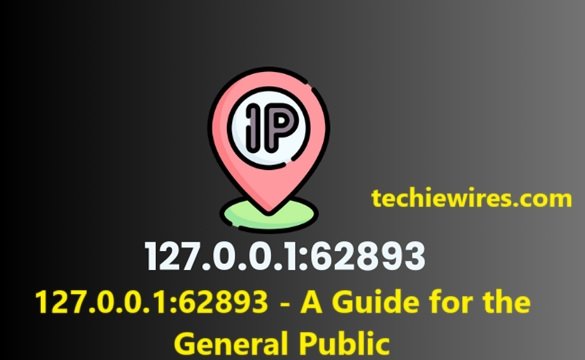You’ve likely heard the term 127.0.0.1:62893 but probably dismissed it as technical jargon that doesn’t concern you. However, this combination of numbers plays a crucial role in how computers communicate, and understanding it isn’t as complicated as it sounds. In this guide, we’ll break it down in simple terms to help you get a clear picture of what it means, how it works, and why it’s important in today’s connected world.
1. Introduction to 127.0.0.1:62893
Have you ever wondered how your computer communicates with itself or other devices? This is where 127.0.0.1:62893 comes in. This combination of an IP address and a port number is essential in networking and computer science, and though it might seem daunting at first, it’s something you interact with almost every day, even if you don’t realize it. Let’s break it down step by step.
2. What Does 127.0.0.1 Mean?
The number 127.0.0.1 is an IP address, but it’s not just any IP address—it’s the localhost address. Think of it as a telephone number that connects you directly to yourself. When a computer uses 127.0.0.1, it’s essentially talking to itself, allowing you to test or configure various systems without leaving the computer. It’s also commonly used in server setups for testing applications without affecting the outside network.
Localhost in Simple Terms
Imagine you’re in a room full of people, and you want to talk to yourself to test your voice recorder. Instead of shouting out for everyone to hear, you whisper to yourself. That’s what 127.0.0.1 does—it keeps the communication local, within your own system.
3. Port 62893: What’s Its Role?
While 127.0.0.1 is the IP address, 62893 is a port number. Ports are like doors that let specific kinds of traffic in and out of a computer. Port 62893 allows communication through a specific door, and it might be used for specific services or applications on your machine. Computers use thousands of ports to manage different tasks, and this particular one could be associated with specific software you’re running.
4. Why Do We Use 127.0.0.1:62893?
The combination of 127.0.0.1 and a port number like 62893 allows you to direct traffic in a very specific way. It’s like specifying a room inside your house (the port) when you’re telling someone (your computer) where to deliver a package (the data). This specific setup helps developers and IT professionals work on applications locally before deploying them to a broader network.
5. The Concept of Localhost
To fully grasp 127.0.0.1, you need to understand the idea of a local host. In simple terms, localhost is your computer. When developers run programs and tests on their own machines using localhost, they don’t require an internet or external network connection.
It’s a safe and controlled environment where things can be tested before being put into the wild. Think of it as a sandbox—a place where you can try things out without messing up the actual network or data.
6. Understanding IP Addresses
An IP address is like a street address for your computer or device. Every device that connects to the internet has an IP address, which is used to route information between devices. 127.0.0.1 is special because it’s reserved for local communications within a computer. It doesn’t connect to other machines or go out to the broader internet. It’s essentially a shortcut that only the machine itself can use.
7. How 127.0.0.1:62893 Affects Everyday Users
You might be wondering, “Why does this matter to me?” While you may not directly interact with 127.0.0.1:62893, it plays a behind-the-scenes role in many online activities. For example, if you’ve ever used a web browser to access a website on your own computer, you’ve likely used localhost without even realizing it.
Developers, gamers, and system administrators frequently use this address to run local servers, test games, and develop applications before releasing them to a live environment.
8. Security Implications
One of the advantages of using 127.0.0.1 is security. Since this address is local to your computer, it can’t be accessed from the outside world. This makes it a secure way to test software or applications without risking outside interference. However, security issues can arise if you’re running a local server and accidentally expose it to the broader internet through a misconfiguration.
9. How to Access 127.0.0.1:62893
Accessing 127.0.0.1:62893 is as simple as typing the address into your web browser or terminal. If you’re running a local server or testing a web application, this address will route your request to your machine. In development environments, we frequently use tools to simulate real network connections without having to leave the local system.
10. Common Issues and Troubleshooting
Like anything in technology, issues can arise when working with 127.0.0.1:62893. Common problems include port conflicts (when two applications try to use the same port) and firewall settings that block local traffic. Fortunately, these issues are usually easy to fix with a bit of troubleshooting.
Simple Troubleshooting Steps
- Check for Port Conflicts: If two applications are trying to use port 62893, one will fail. Changing the port number in one of the applications usually fixes the issue.
- Adjust Firewall Settings: Ensure that your firewall isn’t blocking local traffic on port 62893.
- Restart the Service: Sometimes, simply restarting the application or service can resolve the problem.
FAQs About 127.0.0.1:62893
1. What is 127.0.0.1:62893 used for?
A computer user can test and run applications locally without the need for an external network using 127.0.0.1:62893. It’s a way to communicate with your own machine using a specific port.
2. Can anyone access 127.0.0.1:62893 from outside my computer?
127.0.0.1 is a localhost address, meaning it only works within your own computer. Other devices or users over the internet cannot access it.
3. What does the port number 62893 mean?
The port number 62893 is a specific entry point for certain kinds of traffic or applications. It acts as a door that lets data in and out for specific tasks or services.
4. How can I troubleshoot issues with 127.0.0.1:62893?
Identifying and resolving common issues often requires checking for port conflicts, adjusting firewall settings, or restarting the service. Ensure no other application is using the same port.
5. Do I need to understand 127.0.0.1:62893 for everyday computer use?
For most people, understanding 127.0.0.1:62893 isn’t necessary for everyday use, but it’s useful for developers, gamers, and IT professionals working with local servers or application development.
Read More: Triangle Tech


